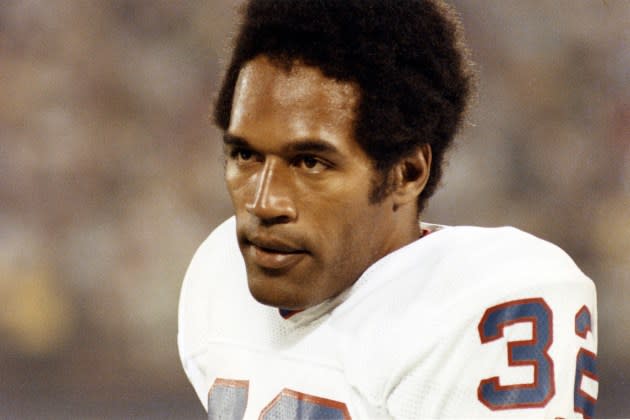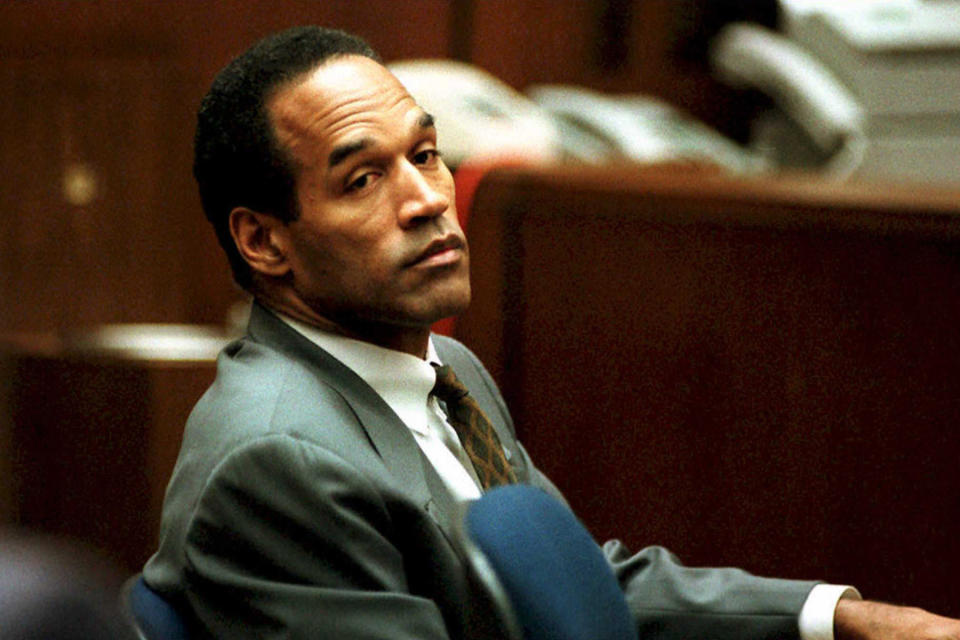O.J. Simpson, Football Hall of Famer Accused of Double Murder, Dead at 76

Orenthal James “O.J.” Simpson, the football star turned actor who became the center of one of the highest-profile trials in U.S. history when he was accused of murdering his ex-wife and another man, died Wednesday at the age of 76.
Simpson’s children announced his death Thursday, saying that their father died following a private cancer battle. “On April 10th, our father, Orenthal James Simpson, succumbed to his battle with cancer,” his family said in a statement. “He was surrounded by his children and grandchildren. During this time of transition, his family asks that you please respect their wishes for privacy and grace.”
More from Rolling Stone
Norm Macdonald Was the Hater O.J. Simpson Could Never Outrun
'If I Did It': Revisiting O.J. Simpson's Book Where He 'Hypothetically' Admitted To Murder
Fred Goldman on O.J. Simpson's Death: 'The Only Thing That Is Important Today Are the Victims'
On April 10th, our father, Orenthal James Simpson, succumbed to his battle with cancer.
He was surrounded by his children and grandchildren.
During this time of transition, his family asks that you please respect their wishes for privacy and grace.
-The Simpson Family— O.J. Simpson (@TheRealOJ32) April 11, 2024
In February, a television station in Las Vegas — where Simpson resided in recent years — reported that Simpson was undergoing treatment for cancer. Simpson did not confirm or deny the reports, but denied rumors that he was in hospice care. “My health is good,” Simpson said in a social media video posted before the Super Bowl. “I mean, obviously I’m dealing with some issues, but I think I’m just about over it.”
Born with generational football talent and a million-dollar smile, Simpson’s post-football stardom — thanks largely to roles in the Naked Gun series, his job as a Hertz pitchman and his play-by-play duties — quickly turned to infamy after he was charged in the killing of ex-wife Nicole Brown Simpson and her friend Ron Goldman in 1994, resulting in an inescapable murder trial that placed him in the nation’s limelight and a divisive acquittal.
Simpson was born and raised in San Francisco, and spent most of his time at a nearby recreation center where he honed his love of sports and athletics. “It was those years, between 8 and 16, where I developed what athletic skill I had,” he told Rolling Stone in 1977. “I think I spent more time at the Center than I did at home or at school.”
Coming of age in San Francisco at that time, Simpson idolized Giants star Willie Mays, and even thought he might similarly make it as a professional baseball player. By high school, though, he was excelling in football and making a name for himself as an all-city halfback. But Simpson was also struggling academically and running with local gangs, which led to multiple arrests as a teenager. After his third arrest, someone organized a special meeting for the 17-year-old with Mays himself.
“It wasn’t any heavy sit-down rap about, ‘don’t get in trouble,’” Simpson recalled. “It was just about ability, man. I was all-city halfback at Galileo and into all sorts of sports. He’d say, ‘You got so much ability.’ And I really wanted to be a professional baseball or football player. The point that came through to me was: Hey, man, Willie was from Alabama where he had nothing. And he told me, ‘Just your ability can get you over. You got the ability. Don’t screw it up, man.’”
Simpson began his college career at City College of San Francisco, where he eventually caught the attention of coaches at bigger schools with bigger football programs. He chose the University of Southern California, and during his two seasons in 1967 and 1968, he led the nation in rushing and won the Heisman trophy during his second year. Most famously, Simpson scored a 64-yard touchdown to help USC win a crucial game against their big rivals UCLA during the 1967 season.
The Buffalo Bills selected Simpson with the first pick of the 1969 NFL draft, but he struggled his first few seasons under coach John Rauch. The appointment of Lou Saban starting in the 1972 season changed everything: Simpson rushed for 1,000 yards that year, and two years later, in 1973, became the first player to break 2,000 yards in a single season landmark. The feat also helped him become the NFL’s MVP and Offensive Player of the Year.
Though Simpson never won a Super Bowl, he enjoyed one of the most illustrious individual careers in NFL history: He made five Pro Bowls, led the NFL in rushing yards four times and rushing touchdowns two times, and was the league’s overall scoring leader in 1975. His 1973 record of 143.1 rushing yards per game still stands.
Simpson spent nine seasons with the Bills before returning to San Francisco, where he played two seasons with the 49ers before retiring at the end of the 1979 season. Afterward, he seemed primed to jump fully into acting, which he’d been dabbling in during his professional football career. His first film role was the 1974 drama, The Klansman, which found him starring alongside acting heavyweights Richard Burton and Lee Marvin. And while Burton was struggling with alcoholism during the shoot, Simpson recalled how he still managed to excel as a performer.
“There would be times when he couldn’t move, but he could change the meaning of a scene with just his voice,” he told Rolling Stone. “I studied that. We used to play a game: try to ignore Richard Burton when he’s talking. It’s impossible.”
Simpson went on to appear in major projects like the 1977 TV adaptation of Roots, as well as big-screen thrillers like The Towering Inferno and The Cassandra Crossing. After retiring from football, his main acting role was HBO’s football-based sitcom, 1st & 10, which ran between 1984 and 1991. He was also famously cast in The Naked Gun franchise as Detective Nordberg, a cop with a habit of suffering extremely prolonged and painful mishaps.

But what appeared to be a successful post-football career came to a sudden and shocking end on the night of June 12, 1994, when Simpson’s ex-wife Nicole Brown Simpson and her friend Ron Goldman were found viciously stabbed to death outside of her Los Angeles home.
What followed was one of the most infamous court cases in American history and the trial that ushered the true-crime era into the mainstream: Soon after attending Brown Simpson’s funeral, Simpson was charged with her and Goldman’s murder on June 17.
Before he was arrested, however, Simpson had his friend and lawyer Robert Kardashian publicly read what was perceived as Simpson’s suicide note. Simpson — with his friend and former teammate Al Cowlings at the wheel of a Ford Bronco — sat in the backseat with a gun allegedly to his head as Cowlings led police on a slow-moving chase down Los Angeles’ highways, an event that was picked up live by the nation’s TV networks and even interrupted Game Five of the NBA Finals, where it was shown as a picture-in-a-picture. The Bronco chase — which was viewed by an estimated 95 million people and rivaling only the Super Bowl — ultimately culminated at Simpson’s Brentwood estate, where he surrendered to police and was booked on murder charges.
Taking place in the aftermath of the Rodney King trial and the L.A. riots, The People of the State of California v. Orenthal James Simpson — in what media and the masses called the “Trial of the Century” — dominated airwaves and headlines for 10 months in 1995, beginning in January of that year and ending in October.
Along the way, the trial created moments that now live in pop-culture infamy, from Simpson’s “Dream Team” rotating cast of high-priced lawyers — from Johnnie Cochran to Robert Shapiro to F. Lee Bailey — and the allegations of racism levied against LAPD detective Mark Fuhrman, to Kato Kaelin and Cochran’s “If the glove don’t fit, you must acquit” quip about the bloodied glove found at the murder scene that perhaps turned the tides of the trial.
Following the 10-month trial — the proceedings of which were broadcasted live daily — Simpson was found not guilty of the murders, a verdict that split the nation and allowed Simpson to resume his public life. A wrongful death lawsuit, filed by Goldman’s family, concluded in 1997 with Simpson being found responsible for Goldman and Brown Simpson’s murders. The civil trial jury awarded the Goldmans $33.5 million in damages.
In the decade after his acquittal, Simpson leaned in to his newfound notoriety, even co-writing a 2007 book about the murders called If I Did It that describes the killing of Brown Simpson and Goldman from the perspective of O.J. if he had committed the murders. Following controversy surrounding the book and a planned TV special, publishers decided not to release the book, although copies eventually made their way online. (Goldman’s family would eventually claim the rights to the book in part to satisfy the $33.5 million civil judgment against Simpson; they agreed to allow the book to be published in September 2007 under the title If I Did It: Confessions of the Killer.)
Justice would eventually catch up with “The Juice”: on September 13, 2007 — ironically, the same day If I Did It: Confessions of the Killer was released — Simpson was among those charged in the armed robbery of sports-merchandise dealers in a Las Vegas hotel room. The dealers were in possession of Simpson memorabilia that Simpson himself believed was stolen from him.
Three days after the heist, Simpson was arrested on 12 charges, including conspiracy to commit robbery, burglary while in possession of a deadly weapon, and two counts of first-degree kidnapping. While Simpson’s infamous murder trial was a nearly yearlong affair with powerhouse lawyers, his trial on the robbery charges lasted less than a month, and on Oct. 3, 2008 — exactly 13 years after Simpson was acquitted for Brown Simpson and Goldman’s murders — a jury found Simpson guilty of all 12 charges.
Simpson was sentenced to 33 years in prison for his role in the robbery; he would only spend eight years of that behind bars and was released on parole in October 2017.
In the years after his release Simpson refashioned himself as a prolific social media personality, spouting his opinion on sports and the day’s news on a near-daily basis. (“Hey Twitter World, it’s me, yours truly,” he would begin each video.) He also made an (unintentional) appearance on Sacha Baron Cohen’s hidden camera show Who Is America? in 2018, where Cohen attempted to coax a murder confession out of Simpson. “I didn’t kill nobody,” Simpson said on the episode.
Best of Rolling Stone
